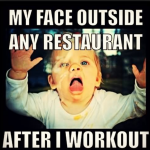I once was a ‘fasted cardio’ fan, but I’ve since changed my tune. 
Doing cardio on an empty stomach is popular with physique competitors and bodybuilders striving to get as lean as possible. The theory is that low insulin levels associated with fasting are conducive to fat breakdown, meaning there are more fatty acids available to be used as energy during the workout. The research indeed shows that fasted cardio can increase fat utilization during exercise compared to performing cardio in a fed state – except that this only occurs at a very low intensity for 60 minutes.
Research also shows that people who burn fat during their exercise session actually burn less fat after exercise :/
While one study from Poland shows cardio on an empty stomach burns more fat DURING exercise, if you’ve read anything I’ve ever written, I’m a big advocate of raising metabolism so that you burn calories even AFTER your workout is done. This is called ‘after burn’.
This is where the real benefit of fat burning exercise comes.
Obviously my bias as to whether you should perform cardio on an empty stomach is likely becoming clear.
I’m not a fan and here’s why:
#1: The “afterburn effect” is minimal with fasted cardio
The major benefit of ‘after burn’ is that you burn extra calories as you shower after your workout and drive to work since your metabolism is still jacked up.
Eating before exercise promotes substantial increases in afterburn. As well, as you burn more carbohydrates during your workout, your body will burn more fat post exercise. (You can burn more fat during your workout on an empty stomach but you may have less ‘oomph’ to put into your workout, so your overall caloric burn will be less.)
While you may burn more fat during your workout on an empty stomach, your overall workout output will be lower. Plus your body’s ability to burn fat post-exercise will be compromised.
If you’ve ever tried an intense workout on an empty stomach, you may find that you run out of gas pretty early into it. Your body performs best with a steady source of glycogen and a small snack pre-workout helps.
So…cardio or no cardio before breakfast?
Overall, you’ll burn fewer calories both during and after exercise in a fasted state diminishing total fat loss.
I’m all about ‘performance’. When you can put ‘your all’ into a workout, you’ll get the most benefit. (It’s always good to see that my theories are backed by science too – go figure.)
Oh, and examples of what to eat before training?
My suggestion is some complex carbs with a little protein so you don’t get a blood sugar spike.
Different people can tolerate different foods. One of my fitness boot campers almost lost her lunch (well, breakfast) of a hard boiled egg and apple, so it’s up to you to figure what works best.
The answer depends on a number of factors, including intensity and duration of training, and the timing of previous meals before your workout.
You need to think about the BIG picture.
When you can train your hardest, your body will reward you the most.
Weight loss or INCHES lost and increased performance will usually be the happy benefit of hard and intelligent training.
You do the hard training – I’ll keep you informed to get the best results…
Oh, and if you’d like to apply for my coaching program, CLICK HERE.




